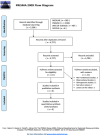Weaning from mechanical ventilation in people with neuromuscular disease: a systematic review
- PMID: 34521661
- PMCID: PMC8442075
- DOI: 10.1136/bmjopen-2020-047449
Weaning from mechanical ventilation in people with neuromuscular disease: a systematic review
Abstract
Objective: This systematic review aimed in assessing the effects of different weaning protocols in people with neuromuscular disease (NMD) receiving invasive mechanical ventilation, identifying which protocol is the best and how different protocols can affect weaning outcome success, duration of weaning, intensive care unit (ICU) and hospital stay and mortality.
Design: Systematic review.
Data sources: Electronic databases (MEDLINE, EMBASE, Web of Science and Scopus) were searched from January 2009 to August 2020.
Eligibility criteria for selecting studies: Randomised controlled trials (RCTs) and non-RCT that evaluated patients with NMD (adults and children from 5 years old) in the weaning process managed with a protocol (pressure support ventilation; synchronised intermittent mandatory ventilation; continuous positive airway pressure; 'T' piece).
Primary outcome: Weaning success.
Secondary outcomes: Weaning duration, ICU stay, hospital stay, ICU mortality, complications (pneumothorax, ventilation-associated pneumonia).
Data extraction and synthesis: Two review authors assessed the titles and the abstracts for inclusion and reviewed the full texts independently.
Results: We found no studies that fulfilled the inclusion criteria.
Conclusions: The absence of studies about different weaning protocols for patients with NMD does not allow concluding the superiority of any specific weaning protocol for patients with NMD or determining the impact of different types of protocols on other outcomes. The result of this review encourages further studies.
Prospero registration number: CRD42019117393.
Keywords: intensive & critical care; neuromuscular disease; respiratory medicine (see thoracic medicine).
© Author(s) (or their employer(s)) 2021. Re-use permitted under CC BY-NC. No commercial re-use. See rights and permissions. Published by BMJ.
Conflict of interest statement
Competing interests: None declared.
Figures
References
Publication types
MeSH terms
LinkOut - more resources
Full Text Sources
Medical

